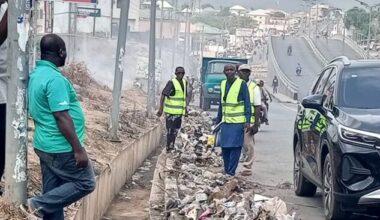The death toll in Monday’s earthquake in Syria and Turkey has increased to no fewer than 8,700, officials have confirmed.
The death toll in Turkey has risen to 6,234, according to the country’s disaster agency.
It is difficult to verify the number in Syria, but its state media reported about 2,500 people have been killed.
The White Helmet rescue group, which operates in the rebel-controlled area, say the death toll has risen to more than 1,280.
Rescue teams from overseas began deploying in Turkey on Tuesday after a pair of powerful earthquakes a day earlier killed at least 4,000 people in the country and neighboring Syria, leaving millions to suffer without power or heat throughout a snowy night.
As dawn neared, people in both countries were set to spend a second day searching through the ruins of thousands of buildings left damaged or demolished by a magnitude 7.7 quake that hit near the Turkish city of Gaziantep on Monday morning. Another temblor measured at 7.6 struck nearby just nine hours later, according to Turkey’s disaster response management agency, known as AFAD.

Rescue teams from Romania, Switzerland, Azerbaijan and Lebanon have been sent to the quake zone, Turkey’s Vice President Fuat Oktay said, part of broad international effort to quickly respond to the crisis. Chinese media said the government will offer 40 million yuan ($5.9 million) in assistance.
Turkey’s defense ministry said the military has started evacuating some of the injured via navy ships from the Iskenderun port in the easternmost corner of the Mediterranean while working to set up field hospitals in the quake zone. Turkey’s Anadolu news agency showed one plane with victims arriving in Istanbul. More than 330,000 quake victims have been moved into hostels and university campuses, Oktay said.
In Kahramanmaras, one of the areas hardest hit by the second temblor, members of an extended family huddled in a makeshift cabin at a construction site, waiting for rescue workers to come and pull out a 55-year-old female relative from the rubble of a pancaked apartment building.
“I convinced one rescue team to come and check, but they left saying ‘we will come back,’ and we’ve been waiting for them since yesterday,” Ibrahim Incoglu, 48, said by phone from the town of Elbistan. “We were able to find wood to keep us warm overnight but we’ve no food and can’t leave. Many buildings have collapsed or been badly damaged and the number of rescue teams are inadequate.”
President Recep Tayyip Erdogan said Turkey is facing “the strongest disaster in a century.” Speaking on Monday before the second quake struck, he said it was impossible to speculate about the final death toll. Turkey later declared seven days of mourning.
The death count stood at 2,921 in Turkey early Tuesday, according to the country’s disaster agency, while the Associated Press said more than 1,000 were killed in Syria. The quakes left almost 16,000 injured in Turkey as a shortage of gasoline in the quake zone hampered the rescue operation, reports said.
At least four Turkish airports were damaged, said authorities, who were tracking calls for help on social media from people who were believed to be trapped under the rubble. More than 6,200 buildings have collapsed in Turkey, authorities said.
Among those affected were many of Turkey’s 3.7 million registered Syrian refugees, the biggest such population in the world.
Turkey stopped oil flows to Ceyhan export terminal on the Mediterranean coast as a precaution, although no leaks were detected on the pipelines feeding crude to the facility, according to an official with direct knowledge of the matter. Iraqi Kurdistan suspended oil exports through Turkey to the terminal, the Ministry of Natural Resources in Kurdistan said.
Ceyhan is a vital hub for oil sales from northern Iraq and Azerbaijan. The port exported over 1 million barrels a day in January, or 1% of global oil supplies. The shutdown helped push up prices on Monday.
US President Joe Biden and other world leaders offered condolences. Biden said the US deployed teams to support Turkey’s search-and-rescue operations, and “US-supported humanitarian partners are also responding to the destruction in Syria.”


